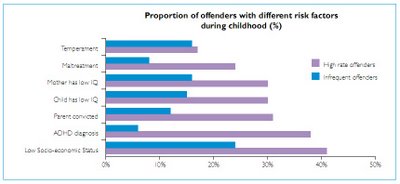After the understandable explosion of coverage over the weekend after the deaths of 4 men in London alone on the same day, including the 20th teenager to have been killed in the city this year, the reaction to the actual Youth Crime Plan itself, which has been long in the drawing up, has been almost entirely muted.
Partly this was because over the weekend the government managed to yet again get itself in a frightful muddle of its own making. Spurred into action by the immediate howling that something must be done from the newspapers, and also to respond to the Tories' pledge that anyone caught carrying a knife would be sent to prison, Jacqui Smith toured the studios on the Sunday making clear what the tough community punishments would be, as opposed to locking the miscreants up for God knows how long. This would involve restorative justice sessions, taking teenagers into hospitals to see victims of violent crime, face to face meetings with victims, and community sentences of up to 300 hours to be carried out on Friday and Saturday nights. Because Jacqui Smith was suitably vague, doubtless because all these measures had been thought up incredibly quickly, she gave the impression that teenagers were going to be taken into accident and emergency wards to see victims almost as soon as they had been wheeled into be patched up. The media ran with this, and then also got a father who had lost a child to knife crime in one instance saying that he would have nothing to do with seeing the perpetrators of his son's death face to face. It was apparent this wasn't what the government was suggesting, with them instead giving the possibility that offenders would be taken onto normal wards to see victims of violent crime, and only then if it was agreed with the individuals themselves and the doctors, and that only those who wanted to take part in such restorative face to face schemes with those who had carried knives would be considered for such sessions, but the media screamed U-TURN when Jacqui Smith stood up on Monday and gave a more substantial account of the proposals.
The whole avoidable escapade overshadowed the fact that this was actually a far better and more likely to work scheme than the blunt instrument of the Tory prison for anyone who carries a knife nonsense. No one challenged the Conservatives over the very basics of such a plan: with prisons already overcrowded and close to total capacity, how on earth would they provide the spaces needed for such a draconian policy? The completely useless answer to this is that the Tories plan to sell off some of the Victorian prisons and build new ones (as originally proposed by our friends at Policy Exchange). That this doesn't solve the problem at all, makes you wonder who wants to buy the prisons in the first place, especially in the current climate, and is in the neverland realm of time doesn't seem to matter. How exactly would prison solve anything anyway? We already know that prison for the young either doesn't work, or in fact equips them for an entire life of crime rather than deliver the sharp shock that might be necessary to get them out of carrying a knife, but it's a populist, easy proposal which you can make in opposition and not get called upon for.
The Youth Action Plan generally seems to have understood for the first real time under New Labour that the tough talking, eternal crackdowns and constant new initiatives have not worked. All they have done is just wetted the appetite for more of the same, and given the consistent impression that it's what we're going to get. This change in tact is almost certainly the work of Ed Balls, who's managed to persuade, with the Supreme Leader's help, the more Blair-inclined Smith and Straw of the virtues of a welfare based approach. Out has gone the distraction that was the ABSO, first introduced by Straw but not really used habitually until David Blunkett was home secretary, and in has come the view that targeting of those most at risk of turning to crime, the crucial involvement of parents and the setting up of dedicated local youth offending teams, involving all the local services, from the police to the social services to the schools, all involved in monitoring progress and intervening if necessary.
 As identified by Mark Easton, the real heart of the report itself is not in the new measures proposed, but in the research behind it to back up its own suppositions. Hence 5% of youth offenders make up 50% of the actual crime committed, the hard core that do so much to give the vast majority a bad name. Equally, it identifies the factors that so increase the chances of someone being a prolific offender rather than one who might get in trouble once or twice during their childhood. Predictably, being a member of a "delinquent" group vastly increases the chances of offending; what doesn't however is a person's temperament, with both infrequent and prolific (high rate) offenders having broadly the same chance. What does make the difference is maltreatment as a child, if a parent is convicted of a crime, ADHD diagnosis, and low socio-economic status. Nothing ground breaking there either, but it has the useful effect of confirming what you already think that you know. This might be where specific targeting and targets can get over their deservedly bad name: specifically intervening where there is potential trouble ahead can in this instance make all the difference. Understandably, this does raise concerns about the nanny state, interfering in the family structure and the potential demonising of individuals; if however we are to make progress and as a result stop the mindless impression that everything is permanently getting worse and that the next generation are going to bring us all down, it might well be a necessary evil.
As identified by Mark Easton, the real heart of the report itself is not in the new measures proposed, but in the research behind it to back up its own suppositions. Hence 5% of youth offenders make up 50% of the actual crime committed, the hard core that do so much to give the vast majority a bad name. Equally, it identifies the factors that so increase the chances of someone being a prolific offender rather than one who might get in trouble once or twice during their childhood. Predictably, being a member of a "delinquent" group vastly increases the chances of offending; what doesn't however is a person's temperament, with both infrequent and prolific (high rate) offenders having broadly the same chance. What does make the difference is maltreatment as a child, if a parent is convicted of a crime, ADHD diagnosis, and low socio-economic status. Nothing ground breaking there either, but it has the useful effect of confirming what you already think that you know. This might be where specific targeting and targets can get over their deservedly bad name: specifically intervening where there is potential trouble ahead can in this instance make all the difference. Understandably, this does raise concerns about the nanny state, interfering in the family structure and the potential demonising of individuals; if however we are to make progress and as a result stop the mindless impression that everything is permanently getting worse and that the next generation are going to bring us all down, it might well be a necessary evil.
There are, as Lee Griffin especially has noted, some of the more harebrained ideas still in the plan. The eviction of families from council houses should they consistently fail to comply with successive orders, parenting ones as well as ASBOs, is a barmy idea which either just puts the problem somewhere or potentially makes the family homeless which makes a bad outcome even more likely. It simply isn't going to happen, and is probably only in there for the benefit of the tabloids and to make the whole deal same harsher than it otherwise is. Lee also objects to "unpaid work in the community" on Friday and Saturday night for child criminals, which I think is actually not so bad an idea. It's clearly just another harsher way of saying community service, and carrying it out on the nights when most teenagers go out will be the sort of punishment that might just get through to the minority that if they decide to act like morons or plague people to death that they'll have their leisure time to do so taken away. The only problem is just who will supervise it and given up their own weekends. Where I do agree with Lee and others is on the completely disproportionate mass curfew orders which the government is encouraging, which stigmatise youth as a whole rather than dealing with those who are a pain. Most the time it's not even that they're actually committing any sort of offence, it's that they're daring to be on a street corner or outside at all. There was a local news report the other week about anti-social behaviour where one guy who didn't want to be identified's chief complaint was that some of the youths had "called him names"; for fuck's sake people, grow some sort of a backbone. Especially illiberal is the Redruth saga, where kids who dare to be outside after 9pm during the school holidays are to be marched back home and their parents potentially given orders to keep them inside and otherwise, when they haven't broken any rule but have transgressed over the threshold of being young and outside at night.
On the whole however, the plan is mostly sensible, level-headed, backed up by evidence and might just well actually confront some of the most intransigent problems in some communities that we face today. It's a break with the tough on crime without being tough on the causes sense that has blighted policy for the last decade. The real tragedy is that it's likely to be thrown out the window by the Conservatives before it's even had a chance to work.Labels: crime, Ed Balls, knife crime, moral panics, New Labour, spin, youth crime, youth crime action plan



